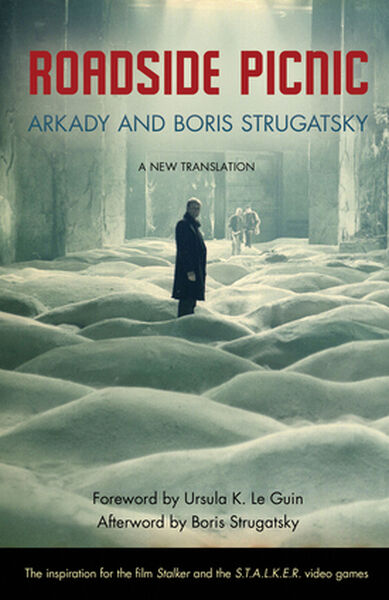Decaying capitalism meets triumphant bourgeois ideology in a Soviet-era classic
Roadside Picnic
By Arkady Strugatsky & Boris Strugatsky

24 Sep, 2014
0 comments
I should be better read in the Strugatsky Brothers’ oeuvre than I actually am so when I get the chance to read something of theirs, particularly a modern translation, I take advantage of it.
In this short novel, first published in 1972, alien visitors littered a region now called the Zone wih enigmatic, often dangerous, occasionally valuable artifacts. For some, the possible riches outweigh the certain risks and although there is an official UN Institute charged with studying the Zones safely, the potential commercial value of the alien artifacts is enough to finance a healthy black market in them. The Zone where the alien artifacts is quarantined, supposedly reserved for approved personnel, with borders patrolled by armed guards, but of course this only reduces the number of “Stalkers,” unauthorized treasure hunters.
The book as a whole is barely over 200 pages; the story is told as four short novellas. The first serves to introduce the main protagonist, Redrick “Red” Schuhart, whose official job as a laboratory assistant in the Harmont Branch of the International Institute of Extraterrestrial Cultures provides a cover for his activities as a Stalker. Red provides the reader with their introduction to the Zone; Red is a native of the area and while he was absent during the traumatic alien visitation1 he is determined to remain in the Zone even though it means risking death every day while supplying some pretty shady characters with such interesting materials as “Hell Slime”.
We follow Red over the next eight years, as he deals with the revelation that his love Guta is pregnant, with their decision to keep their strange Zone-charmed daughter Monkey, with the consequences of his exposure as a Stalker, and finally with his confrontation with an alien device whose implications for the world are profound.
If Roadside Picnic is set in the Strugatskys’ Noon Universe, it is well before the Earth becomes a Socialist Utopia and any hints that there is a connection are quite subtle (unless of course the Device plays a role in establishing the utopian Noon setting). Where this is set exactly is an interesting question, although the text seems to rule out Africa, Europe or Asia. It is most likely North America, but the concrete place names are not drawn from actual ones and no country’s name is ever mentioned that I saw. The book was intended as a criticism of decaying capitalism and triumphant bourgeois ideology and setting it in the US seems like kind of a no-brainer for a Soviet-era SF author but perhaps the authors didn’t care to tie the work to a specific region like that.
(Surely they had access to decent atlases, right?)
As the title indicates, while the alien visit had a transformative effect on the humans, there’s no evidence that the aliens intended any of that or were even particularly aware of the humans. Humans may simply be playing the role of wild animals poking through the detritus left by civilized picnickers. People looking for solid answers to many of the questions raised in this should look elsewhere; that’s not what this book is about.
In addition to the novel, the Chicago Review Press edition includes a foreword by Le Guin and an afterword by the surviving Strugatsky brother, Boris.
Judging by the content of the Le Guin foreword, I would be willing to bet a certain sum of money that Le Guin was not given access to Boris’ essay before she wrote her foreword. Admittedly, the foreword is a reworked version of a review she wrote for the A.W. Bouis translation of Roadside Picnic (with snipes from Le Guin at her ideological opponents for refusing to even read Russian SF2) but there is at least one factual statement by her about Russian SF relation to Soviet censorship at the time that is directly contradicted by Boris Strugatsky’s account at the end of the book.
In his essay, Boris relates the epic tale of what it took to get this book published in the Soviet Union of the 1970s, a process stymied by the best efforts of style-deaf Soviet bureaucrats. After an agonizing eight year struggle, Boris and Arkady succeeded in getting their novel into print but only in a butchered form. Boris was somewhat surprised to realize that the people hampering him were not acting out of fear over what might happen to the functionaries if they let some ideologically dodgy bit of fiction by but out of a genuine belief that their extremely narrow view of fiction was the only correct one.
The new edition of Roadside Picnic is available in a variety of formats from Chicago Review Press.
- Probably for the best since survivors turn out to be natural calamity magnets.
- I seem to recall hearing claims that Nicholas Yermakov’s rebranding of himself as Simon Hawke was driven by readers being unwilling to buy what might be translated SF.
